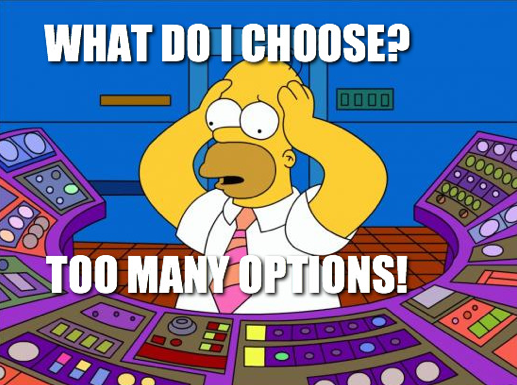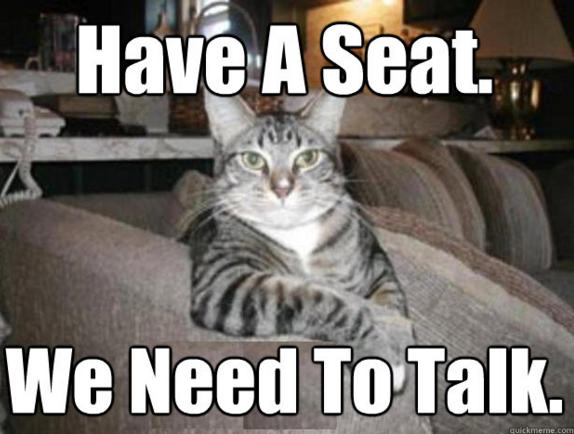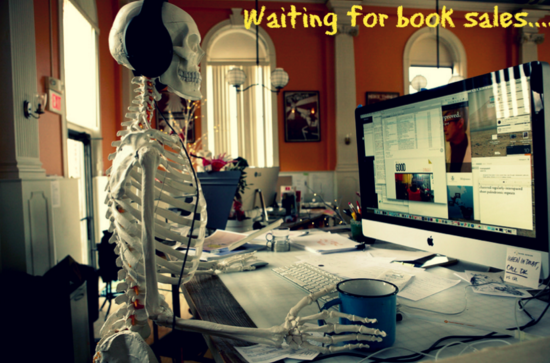
Image via Flickr Creative Commons courtesy of Ken.
Often, when I mention brand and platform, writers assume I am talking about promotion and marketing (ads). That is not only a false assumption, it can be a fatal one.
When we (regular people) hop onto Twitter, Pinterest, Instagram, Facebook or whatever social site, only to get barraged with book spam, a big reason it annoys us is because the author hasn’t taken time to build rapport, earn our trust, and gain permission to sell us stuff.
I kid you not, I signed in to LinkedIn for the first time in like a YEAR the other day and, in less than an hour, some author sends me PM with a link to buy his book. No introduction or hello or liking my stuff or asking if I had pets…
HERE! BUY MY BOOK!
….sure. Right on that. Nice to meet you, too.
*grumbles* *now remembers why I hated LinkedIn*
When approached this way, the promotion either becomes white noise (invisible), or worse, an irritation (negative branding). Writers trying to create a brand by serving up copious book promotion will create a brand all right.
The brand of self-serving @$$hat.
The sight of the author’s face or book might even be enough to spike our blood pressure. We are far more likely to block than buy.
Why? What went wrong?
For promotion to be effective, we have to understand what a brand actually IS.
If we don’t understand what a brand is, then promotion becomes an exercise in futility. Why? The most effective use of promotion—marketing, ads, contests, etc.—is to extend the reach, visibility of an already existing brand.
Sure, some companies will flood the market (prime the pump, so to speak) to launch a new product, service, business that no one knows about, but this is ridiculously expensive and extremely risky. It’s also being done less and less even by companies who have the cash to take this approach.
Brand is not what it used to be.
As Seth Godin said back when the entire concept of branding was being tipped on its head, ‘A brand used to be something else. It used to be a logo or a design or a wrapper. Today, that’s a shadow of the brand, something that might mark the brand’s existence. But just as it takes more than a hat to be a cowboy, it takes more than a designer prattling on about texture to make a brand.’
Even BIG companies these days are going to social media to create the stories, memories, interactions, sets of expectations, conversations and interactions that—taken as a whole—comprise a brand.
Once the brand is defined, the audience cultivated and a rapport established…THEN promotion and ads can be an asset.
Before all this prep work though?
Fuggetaboutit
The days of dropping tens of millions for promotion and ads are gone. It doesn’t work in our modern culture.
In fact, static marketing and traditional promotion had already begun declining in effectiveness with the rise of direct marketing (junk mail).
The barrier to entry for ‘marketing’ fell away with the invention of cheap laser printing.
This opened up advertising and promotion to companies that didn’t have a bazillion dollars to spend on promotion. Right after the inception of Web 2.0 (birth of social media), this decline in effectiveness compounded exponentially.
Even though experts like Seth Godin (and upcoming experts such as myself) wrote post after post discussing how the nature of brands had changed and promotion had to evolve as well, this didn’t stop the big boys from throwing their weight around.
Because if a crap-ton of expensive promotion had worked for a hundred years or more, why wouldn’t it keep working?
Um, because the world was (is) different. The audience had changed and promotion had to change in order to reach an audience that had long moved on.
Alas, it took losing $10 MILLION advertising on Facebook for GM to learn what they could have gotten off my blog for free. Ads without an established relationship (platform and brand) don’t work.
What’s in a Name?

Image via Flickr Creative Commons courtesy of Pierre Lognoul
The formula for a brand is simple:
NAME + PRODUCT + EMOTIONAL EXPERIENCE
The last part is critical. In fact it might be the most critical.
Why do you think corporate empires pay so much for image consultants? Sure, Mylan once had a great reputation as a pharmaceutical company until they got greedy and decided to line their pockets at consumers’ expense.
A few years ago, if we heard the term ‘epi-pen,’ we might have experienced good emotions. Oh it is a life-saving drug. Helping kids with peanut allergies. My cousin had an epi-pen and it saved her life.
Nowadays? Different story. Once consumers found out the top execs had been giving themselves HUGE pay raises while hiking the cost of the only ‘known’ drug of its kind from $100 in 2007 to over $600 by 2017? Everything changed.
See, the company had a great product and had managed to create a rapport with consumers and build a relationship founded on trust. But then Mylan got greedy and took advantage of their consumers, which destroyed the relationship, obliterated trust and—in short—destroyed their brand.
No amount of promotion in the world can repair this. Why? Because this is an excellent example of the order of operations: product–> relationship (platform/audience) which leads to–>promotion–>sales.
I use this example to demonstrate that, while product is essential, brand is more than just the product. Promotion can’t take the place of building and maintaining a strong relationship.
This example is also to illustrate how important emotional experiences with a brand can be, that it has never been just the product.
It isn’t just about a book anymore.
Why Are Brands So Important?

Most of us don’t have time to research each and every purchasing decision and thus, we as consumers, are prone to rely heavily on brands. Brands let us know what to expect.
When we buy Dolce & Gabbana shoes, we expect a certain quality. We go off the name and do far less inspecting and road-testing than we would for a designer/manufacturer we’d never heard of.
We are willing to order ahead of time and pay full price and even ridiculous prices for Louis Vuitton, Ralph Lauren, Prada, Versace, Harley Davidson, Porsche, Tesla, Apple products, John Deer, etc. So on and so forth.
But all of these companies (brands) did the same thing. They began with a solid product linked to a name that promised a unique experience. The name Harley Davidson would be just a name unless it came with a very distinctive type of motorcycle (LOUD).
But a name and a product alone are not enough.
What is a Platform?

Image via Flickr Creative Commons courtesy of Alex Santosa.
Platform is tethered inextricably with brand. If brand is the product, then platform consists of those most likely to consume that product because they emotionally identify with the brand.
Trust me, Harley Davison is not worried about consumers who love Vespas. Sure, they are both motorized bikes, but they are selling to members of vastly demographics and also delivering very different experiences.
Authors are doing the same.
We know who Stephen King is because of his brand (which is a direct result of his products–stories). Because of his brand (tons of books, screenplays, short stories) we know if we are part of his platform or we aren’t.
If we are the type of reader who loves a riveting women’s fiction? King isn’t trying to court us. Why? We might know his brand, but we are not part of his platform.
Stephen King is not worried about Liane Moriarty and Liane Moriarty isn’t worried about Stephen King. Different products, different audiences.
In the old days, there was only one way to create a brand (and consequently a platform) and that was the books. Lots and lots of books (brand) cultivated a body of people who liked our writing/voice (platform). Today that is still a great plan.
With so much junk floating around, when readers find a writer they enjoy, they stick like glue.

Image via Flickr Creative Commons, courtesy of Craig Sunter
Consumers (code for readers) still do this. This is one of the main reasons that we need to keep writing. Stop promoting ONE book. ONE book is not enough to create a strong brand/platform.
Remember:
A brand is a collection of emotional experiences.
A platform is simply those who will enjoy that experience.
Modern writers hold the advantage here.
Before the digital age, it was practically impossible to create a brand outside of the books, because the book was the only source of emotional experiences with the author.
Readers rarely had contact with an author beyond the books. Book signings, maybe magazine or radio interviews gave only slight glimpses of the author beyond the book. Today, with social media? That is no longer the case.
Every blog, tweet, podcast, Instagram post, YouTube video, etc. collectively serve to create the overall brand.
Yet, I want to stop here because there are two HUGE problems I want to discuss.
Problem #1: Please, STOP WRITING

One thing that’s really begun to stand out to me is that far too many writers are…writing. Bear with me. Writers, or authors, are storytellers. Great, you have 80,000 words. That doesn’t mean you have a story.
Writers don’t only write words. We create profoundly emotional experiences…and happen to use words to do this.
Yes, this section is a bit of a segue, but trust me. This small side trip is vital.
I cannot count how many editing samples I receive that are writing, but are NOT stories. This is a BIG DEAL. Authors are in the business of selling stories, not word count.
Let me illustrate, and bear with me. I am riffing this:
Example One (Writing):
Fifi woke up at six in the morning. She reached out her hand to turn off the alarm on her phone, then she pulled off her covers. Sitting up, she put her feet on the floor, stood and walked over to her closet to pick out what to wear today. She caught a glimpse of her auburn hair and peridot eyes in the closet mirror and chose a purple sweater with a gold scarf.
Turning, she walked over to the bathroom, turned the knob and opened the door. Reaching out her hand, she turned on the water, then turned to hang her clothes on the back of the door. Turning back, she stepped into the spray and used her new shampoo, the one that smelled of jasmine and periwinkles.
She washed her long hair twice, because the directions said so, and followed with a deep conditioning treatment because she needed the extra three minutes to go over all she had to do at her new job in customer service at MyNet today.
Example Two (Storytelling):
The ear-splitting blare of a foghorn dragged Fifi from Chris Evan’s embrace right as he was about to kiss her. She did everything she could to remain in the dream, the one where Captain America had somehow fallen madly in love with the newest customer service representative for MyNet, but it was no use. Fifi reached for Cap one final time, and a split second before she could plant one on him…Cap was crushed by an ocean-liner that fell from the sky.
She bolted up in bed, now wide awake and wondering if she was now scarred for life.
Poor Cap.
Cursing, she rifled through her duvet and through the piles of clothes on the floor. She had to find her phone and turn off that god-awful noise before she lost it. A fog horn? Why on earth had she chosen a fog horn?
Then that small, annoyingly responsible voice in her head reminded her how she’d slept through the Zen wind chimes, the less-Zen piano riffs and the birdsongs? Why had she even bothered? It was either the fog horn—turned up to max volume—or be fired two weeks into her new customer service job at MyNet.
Product MATTERS
Example One is writing. A lot of words and nothing happening. Were any of you hooked? TONS of stage direction.
Hint: We all know how the whole ‘door opening thing’ works. We don’t need a ‘writer’ to tell us she reached out her hand, turned the knob and opened the door.
Sure, this is GREAT for making a daily word count that makes us feel all productive, but this is a section of words, NOT a sample of a story.
Stories are about people who have PROBLEMS. Plots are how the core problem (and all the smaller related problems) are solved. Stories are about beating the odds, overcoming adversity.
Our modern world is being BURIED in ‘books’ with more filler than a dollar menu burrito. We’ve got to do BETTER if we hope to stand apart.
Problem #2: Too Good to Mingle with the Masses
I cannot tell y’all how many ‘writers’ I encounter who do not want to do social media…at all. When I mention how vital a platform is, how we need some form of a grassroots movement of people vested in our success, they dismiss me with a knowing smile.
They explain how they already have budgeted for ads, marketing, and promotion. All of this, obviously, will be automated so they have time for ‘more important activities’ than authentically interacting people they want to buy their books…
*stabs self*
Here’s the problem with this line of thinking.
Let’s even assume the book is better than unicorn tears. This isn’t 2001. Ads are so ineffective the print medium has almost gone extinct. The reason ads are ineffective is for a number of reasons.
First, back before 1990, the barriers to entry were so cost-prohibitive only the major players got a voice (we’ve mentioned this). If you opened a magazine, it was pretty much the same brands—big ones with lots of money.
With web 1.0, one had to know how to write code or have the cash to hire someone who knew how to write code. Again, only brands with a lot of capital could even have a website. Only whales had the cash to pay some I.T. nerd to code an ad or code an on-line promotional campaign.
This, again, meant the players were limited.
Fast-forward to 2019. There are web design sites so easy my mother (who was once afraid she’d delete the internet) can build her own site for less than $100. We can use Canva and PicMonkey to make our own ads for free.
Everyone is on social media for free. Zillions of writers are published because there are no gatekeepers. With some free/cheap software and time?
Bada bing bada boom…published author.
This said. After NINE years of book spam, why is anyone still considering spamming people as a viable plan?
After NINE years of writers killing themselves in a race to the bottom (who can give away the most stuff for cheap or free), why is anyone considering solely relying on marketing, ads, promotion and automation?
When was the last time you bought a book from someone who filled your favorite Twitter hashtag with automated ads for their book? Name a book you bought from a person who, minutes after accepting a friend request, PMed you a link to buy their book. Or posted an ad on your page.
#NotRudeAtALL
Promotion: Skip Steps at Your Own Risk

I’ve been around since before Web 2.0 was born. I’ve grown this blog from three hundred visits a month to three million a month.
And I’m not saying I’m anything special. I really should have named my first book I Did All the Dumb Crap So You Don’t Have To. But, suffice to say, I’ve stuck it out long enough to reasonably claim to know a thing or ten.
When I started out, we’d entered an entirely new world of communication, one humans had never experienced…EVER.
There were no rules when it came to the Internet. But, as I learned over time, there were actually rules all along. Why? Who uses the Internet? HUMANS. Social media platforms come and go, trends change, gimmicks skyrocket and then crash…but people don’t change.
Humans still want a good story. They wanted it when Shakespeare was all the rage and they want it now. Humans don’t like people who only pop by to chat when they want something (money). They didn’t like that crap in 1919 and don’t like it in 2019.
Thus, if we get target fixation (learn ALL THE THINGS about promotion) we risk ignoring the factors that truly matter—quality of the book, establishing a platform, choosing the right place to find and cultivate OUR unique audience, etc.
Just because Instagram is all the rage right now does NOT mean it’s a good fit for you, your books, or your brand. Sure, it MIGHT be popular, but it doesn’t mean your potential audience hangs out there.
The prudent author takes time to learn about the various mediums, define their ideal audience, and then plan accordingly. This is how effective promotion has been done for decades.
It’s why fashion magazines and blogs don’t reach out to advertisers pushing synthetic motor oil, racing tires, or laser-guided saws (or vice versa)
Working Smarter NOT Harder

Once we realize promotion is only something we can do effectively AFTER a lot of other steps in this process, it’s easier to relax. We know what to do and in what order and what should take priority.
History and massive amounts of data have demonstrated time after time that ads and marketing (alone) don’t sell books. Never have and never will.
When we understand WHY (read this post) and fully appreciate that books are a wholly unique product that requires a different approach than, say…organic dish soap, we can begin working more effectively.
If we appreciate the distinction between brand, platform, promotion, marketing, etc. then we work smarter, not harder and use resources wisely. Yes, feel free to do the ads and the marketing, just know that it isn’t a Golden Ticket.
If you’re curious about learning more on this topic, February 21st, I’m teaching Social Schizophrenia: Building a Brand Without Losing Your MIND. We’ll go over all the platforms, what each one does, how to use them, and how to determine which is the best fit for finding and growing your audience. Use the code #BlogLove for $15 off.
My goal has always been to help writers do what they love. Y’all can’t write for a living without that platform and a powerful brand that drives sales.
So let’s make a LOVE CONNECTION 😛
And for those who love the weird stuff, I’m teaching A Ripple in Time: Mastering Non-Linear Plotting this SATURDAY.
***All classes come with a free recording.
THANK YOU SO MUCH for your enthusiastic support! Y’all ROCK! I LOVE HEARING From YOU!
Comments, questions? Are you tired of being told you need to be on every social site all the time? Do you just want to get back to writing STORIES? Does the idea of promotion and ads make you hyperventilate?
What are your thoughts?
JANUARY’S AWESOMENESS (CLASSES)
Self-Publishing for Professionals
Taught by USA Today Best-Selling Author Cait Reynold’s on Friday, January 11th 7-10 PM EST PLUS EXTRA GOODIES ($100 for THREE hours of training plus bonus material). The LIVE class has passed, but the recording and bonus material is available with the BUNDLE.
The Business of Writing
Taught by Kristen Lamb on Saturday, February 2nd 1-3 PM EST ($55)
***GET ALL THREE (Self-Publishing for Professionals Jan. 11th, The Business of Writing Feb. 2nd & Pitch Perfect Feb. 7th) IN THE PUBLISHING TRIPLE THREAT BUNDLE for $155
Story Master: From Dream to Done
Taught by Kristen Lamb, Saturday, January 12th, 1-3 PM EST
Social Schizophrenia: Building a Brand Without Losing Your Mind
Taught by Kristen Lamb, Thursday, February 21st, 7-9 PM EST ($55 General Admission/ $195 GOLD)
Yes, I will be teaching about Instagram in this class.
A Ripple in Time: Mastering Non-Linear Plotting
Taught by Kristen Lamb, Saturday, January 19th from 1-3 PM EST $55
Harnessing Our Writing Power: The BLOG!
Taught by Kristen Lamb, Thursday, January 24th 7-9 PM EST $55 General Admission/ $195 GOLD
Fiction ADDICTION: The Secret Ingredient to the Books Readers CRAVE
Taught by Kristen Lamb, Saturday, January 26th 1-3 PM EST $55
SALES: For Those Who’d Rather Be Stabbed in the Face
Taught by Kristen Lamb, Thursday, January 31st 7-9 PM EST $65
The Business of Writing
Taught by Kristen Lamb on Saturday, February 2nd 1-3 PM EST ($55)
Pitch Perfect: How to Write a Query Letter & Synopsis that SELLS
Taught by Kristen Lamb on Thursday, February 2nd, 7-9 PM EST ($55)
For those who need help building a platform and keeping it SIMPLE, pick up a copy of my latest social media/branding book Rise of the Machines—Human Authors in a Digital World on AMAZON, iBooks, or Nook.








13 comments
2 pings
Skip to comment form
Wow! Great post filled with so much info I’m gonna read it a couple more ties. Thanks!
I love reading your posts. You’ve got a knack for making all of this crazy publication business seem- well, if not scary, at least possibly manageable 🙂 This one was especially helpful as I was just stressing over the whole promoting/ads thing- thanks!
Thanks, Kristen, for explaining ‘brand’ and ‘platform’ so well. You’ve given me many ideas on what to work on, and of course, to get busy and write that next book.
Cat
So much helpful information – I appreciate your generosity in sharing what you’ve learned.
May I ask you to consider something: renaming your “Social Schizophrenia” workshop in the interest of increasing respect and reducing stigma for those with mental illness?
Hi Kirsten,
Thank you so much for your feedback. Please know that there was absolutely NO disrespect or denigration meant. We respect your right to your point of view, and we sincerely apologize if you were in any way hurt or offended.
We will not be changing this class title, however, because the usage of ‘schizophrenia’ in this case is neither derogatory nor outside the bounds of its formally accepted definitions. Schizophrenia is a legitimate psycho-medical term that also carries a wider contextual meaning in contemporary usage. Per Merriam-Webster, the second definition of ‘schizophrenia’ is: ‘contradictory or antagonistic qualities or attitudes.’ To use ‘schizophrenia’ colloquially as we do in our class title is akin to using the terms ‘depression’ or ‘paranoia’ in their wider contextual meaning, though they also have precise psycho-medical definitions.
As writers, we probably are ALL hyper-aware of words, meanings, usage, and context. From the evolution and acceptability of certain new words (I’M LOOKING AT YOU, ‘GINORMOUS’…), to the way society’s changing tolerance of old terms (I still remember kids in junior high laughing about someone being ‘a moron’ or ‘a retard,’ which felt wrong then but only today is widely accepted as derogatory and unacceptable), language is the Silly-Putty that reflects our ever-evolving values.
We all have words and issues that touch on sore spots or can make us feel marginalized. Heck, Kristen and I have had knock-down-drag-out’s on everything from ethnic issues is complimenting to the ethics of ad copy and demographic targeting (and you’d be surprised to find out which one of us was on which side, LOL!).
Please don’t feel that I am jumping all over you or this comment in any negative way. I can absolutely see where you are coming from, as can Kristen. As the daughter of a psychologist and a social worker, I am *very* aware of the often extremely negative perceptions of mental health issues in society, and Kristen herself is close to a number of people who have schizophrenia. The last thing she or I would ever want to do is to deliberately insult or hurt anyone.
On the other hand, I believe it’s more important than ever to both acknowledge and engage with difficult questions, tricky issues, and sensitive subjects in a way that is open, compassionate, articulate, and civil.
I have classes I’d love to teach on exactly some of those social landmines, not because I think I have all the answers. I don’t. I want to teach them because I want to open our discussion about dealing with them as writers.
Thank you, Kirsten, for not being afraid to point out something that made you uncomfortable. I hope that, even though we won’t be changing the title of the class, you feel as though we heard you, respect your opinion, and welcome you to keep the dialogue open!
Cait
This is such a wonderful post. I’m sharing it everywhere on social media. Kudos to you.
I understand the writing part and none of the storytelling part.
Sorry, but I rather stick with the “writing”. Thank you very much.
Author
Well, I get the example is a riffed one. But I, personally, won’t spend money to read about how people open doors and cabinets. Filling pages with stage direction is not a story. But to each his own.
Inevitably in my critique group (whom I love dearly) I’ll usually get a comment like, but how did that door open, did they cross the room? When did so-and-so show up? Did she lift the handle or push it?
I get that sometimes these details are needed, but like you I dont’ want to read a book that dully explains how a character moves around the room. I don’t need to see them open the fridge, remove the Brita pitcher, get out the glass, pour the water, and take a drink. She took a drink works.
I’m reading a published book for a contest and it breaks my heart that the author did a good amount of historical research, and what I’m reading is flat descriptions unconnected to action or emotion. I want the setting and details to come alive but it’s just words on a page. What I love about historicals is fashion and period details, it’s a big reason why I read them, but it’s not interesting when the details have no dimension or connection to the characters. Saying “she put on her wool cape and darned socks” is not the same as “she’d almost forgotten the wool cape and at the last minute, dashed upstairs for it, still unseen from her snooping chaperone.” Or whatever. Give me a some action and purpose and make the details pop!
Author
Yeah writing groups are notorious for this sort of feedback. Trust me. No one wants a whole book explaining how doors work. We get it. We are not stupid. You’re cool 😉 . Some ‘advice’ means well but we have to just ignore it. Now, if your character is in a tavern and in the next sentence they are on the side of a mountain? YEAH. Please explain THAT shift. But if someone is going into the living room from the kitchen…we GET IT. Really.
Wonderful article! This is the way I think too. I HATE it when people bkast me with advertisements for anything books included.
Its so rude. When will people get that you have to take a softer approach nowadays?
I have an author friend on Facebook that chats with me and his followers and does promote, his books, but it’s okay as it isn’t all the time and because he has so many other postings that don’t have to do with his book.
It’s all about how people are treated. Too many companies and writers treat the people on Facebook and other sites like we are a number.
Like you said an emotional connection is important. Without it people won’t care. Just like with our books characters if people don’t care tyey won’t read, the same with advertising.
Do you watch t.v and get blasted by the J.D bouer commercials? (However, it’s spelled.) I change the channel immediately as it’s super annoying.
So many online advertising is done this way.
We don’t care about being polite! Ha! Freck the consumer lets freeze up their browser with a million forced pop up adds and java videos and make them buy. Ut has to work its always worked, consumers are stupid, so will buy it.
Why in gods name do they still think this works (and why did it ever work? It’s just plan rude.)
This article (along with others of yours.( hopefully will change minds. <3
I know you're changed mine.
I loved this post, thank you. I find it confusing to say the least out there in the brand/marketing jungle, but you’ve cleared it up. And yes, thank you for saying get back to storytelling, you don’t know how happy that made me feel.
So glad I stumbled on this valuable article and there is so much to absorb that I am going to bookmark and re-read several more times. Lots of things have been clarified here. Thanks for sharing this knowledge and your experience Kristen.
[…] Promotion is Not Platform & Ads are NOT a Brand: Know the Difference by Kristen Lamb […]
[…] Kristen Lamb can tell you that your “brand” is just how people view you and your product – or, the emotional reaction they have when they see your name. […]